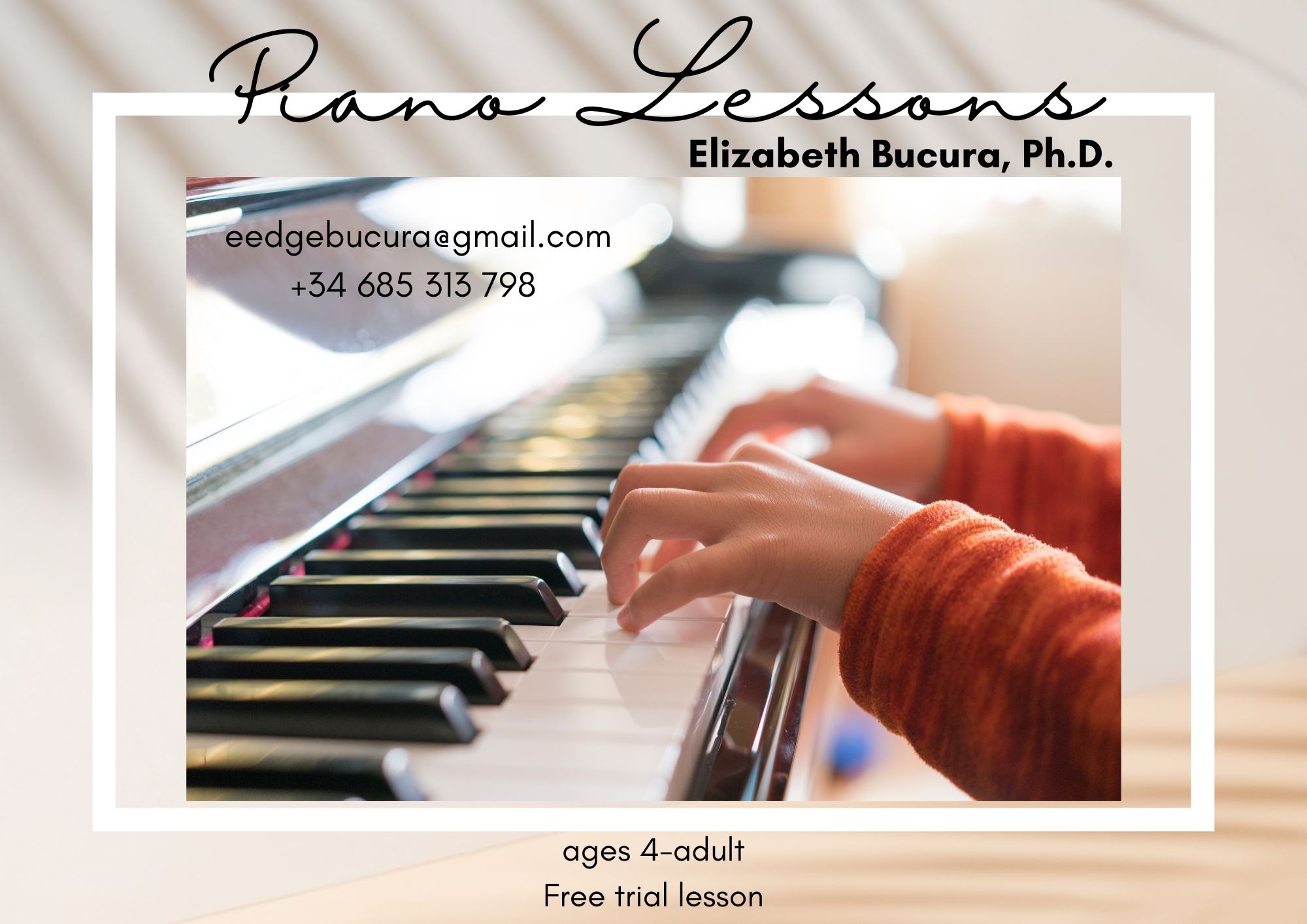


Inspiring Musicianship for Life
Elizabeth Bucura, Ph.D.
Elizabeth Bucura is a composer, music educator, piano pedagogue, award-winning researcher, and author, with decades of experience inspiring and shaping musicians. Distinguished as a pedagogue, teacher-educator, and clinician, Bucura is deeply passionate about piano education and general music, emphasizing the transformative, lifelong journey it can offer. Her dedication shines in guiding educators and students alike, at all levels from early childhood through doctoral studies, and in school, studio, and community settings in varied locations including Maine, Arizona, New York, Austria, and Spain. Bucura is known for fostering creativity, empathy, and connection through studio instruction and in general music and early childhood settings with innovative teaching methods, collaboration, and play. Her research focuses on topics of secondary general music, music teacher identity, reflection in music teacher education, and play in children’s music experiences.
Contact
Marbella Spain 685 313 798
elizabeth@adventurepianosolos.com
An exciting collection of ten modern piano solos for the early intermediate student. Experience magical fairies, outrun patrol, and head into an enchanted fairy forest on this magical quest adventure. This solo collection provides an exciting new repertoire for intermediate pianists’
A Magical Forest Quest
This collection of 10 original, modern jazz-inspired piano solos is the perfect repertoire for students looking to elevate their playing with exciting, fresh pieces. Carefully crafted for middle level and upper-elementary pianists, each piece is designed to be both musically engaging and motivating, making it an ideal choice for piano lessons, recitals, and performances.
Moody Grooves
Coming Soon (Feb, 2025)
Purchase the Adventure Solos collection
Adventure Solos
Individual Piano Solos
Magical Forest Quest
EnchantedQuest of the Brave Heart
Majestic Lull
Mountainside Patrol
Message in the Shadows
Perilous Skies
The Rider’s Resolve
Ethereal Glade of Mischief
Footpath of the Falling Sun
Impish Reel
Echoes of the Fallen
Moody Grooves
Breaking New Ground
Cool Cat Saunter
Rhythm Road
Velvet Glide
Zippy Fritz
Swinging Through Stars
Rocking Chair Tales
Crimson Serenade
Twilight Groove
Bass Step Boulevard
Sea Voyage
Turbulent Storm
Echoes of the Deep
Sea Song
Doldrum Hollows
Veiled Ripples
Memory Adrift
Iron Tides
Brine and Breeze
Research
Monograph
Bucura, E. (in process). Partners in Play: Fostering Empathy, Connection, and Motivation in Piano Learning for Students, Parents, and Teachers. Kruse-Weber, S., Tumler, M., Bucura, E. (2023). Reflect!: Strengthening competencies through playful self-determination for instrumental and vocal music teachers. (English Edition). Grazer Schriften zur Instrumental- und Gesangspädagogik [Graz writings on instrumental and vocal pedagogy]. Munich: Waxmann. Bucura, E. (2022). Music Teacher Identities: Places, people, and practices of the professional self. In S. Kruse-Weber (Ed.). Grazer Schriften zur Instrumental- und Gesangspädagogik [Graz writings on instrumental and vocal pedagogy]. Munich: Waxmann.
Peer-Reviewed Chapters
Kruse-Weber, S., Bucura, E., Tumler, M. (2024). Facilitating collaborative professional development among instrumental and vocal teachers: A qualitative study with an Austrian music school. Frontiers in Psychology. Special Community Series: Towards a Meaningful Instrumental Music Education: Methods, Perspectives, and Challenges. 13:1096188. Doi: 10.3389/fpsyg.2022.1096188 Bucura, E. (2023). Composition in early childhood. In M. Kaschub (Ed.). The Oxford Handbook of Music Composition Pedagogy. Oxford University Press (pp. xx-xx). Bucura, E. (2022). An investigation of middle school students’ meanings in a secondary general keyboard class. In C. V. Fung & L. Lehmberg (Eds.), Meanings of music participation: Scenarios from the United States. (pp. 63-84). New York: Routledge. Doi: 10.4324/9781003242239 Bucura, E. (2019). Secondary general music in middle school and high school. In C. M. Conway, K. Pellegrino, A. M. Stanley, & C. W. West (Eds.), The Oxford Handbook of Music Teacher Education. (pp. 697-720). New York: Oxford University Press. Doi: 10.1093/oxfordhb/9780190671402.013.33 Beauregard, J.; Bucura, E. (2019). “To Thine Own Self Be True”: One Music Educator’s Transition from Higher Education Faculty Member to High School Teacher. In T. D. Smith, & K. S. Hendricks (Eds.), Listening to Voices Seldom Heard: Narratives and Reflections in Music Education (pp. 105-122), in Landscapes: The Arts, Aesthetics, and Education (Springer publishing: L. Bresler, Series Editor).
Peer-Reviewed Publications
Presentations
Bucura, E. (unpublished). Beliefs and practices of secondary general music teac Bucura, E., & Brashier, R. (final edit phase). Preservice music educator identity construction in shifted learning modalities: An exploration of identity, learning, and wellbeing. Bucura, E. (unpublished). Music’s role in the preschool/kindergarten: Reflections from early childhood caregivers in Austria and the United States. Bucura, E. (2023). Playful musicianship in early childhood: Approaches to play pedagogy. Proceedings from 10th Conference of the European Network of Music Educators and Researchers of Young Children (EuNet MERYC). Vienna, Austria. Bucura, E. (2022). Meet4Music: Sharing a space of welcome. In Von Music4Refugees zu Meet4Music: Community music an der Kunstuniversität Graz: Rückblick und ausblick. Eine Festschrift. Waxmann Verlag. Kruse-Weber, S., Kirchgäßner, E. M., Schiavio, A., & Bucura, E. (2022). Reflective writing in a community music project with students in higher music education. Research Studies in Music Education, online, DOI: 10.1177/1321103X221107513 Bucura, E. (2022). Pathways of school and community music: Toward lifelong musicianship. Journal of Arts & Communities, 13, 47-63. https://doi.org/10.1386/jaac_00038_1 Bucura, E. (2022). Bonding and bridging: Perceptions of social capital in community music. Athens Journal of Humanities & Arts, 9, 1-27. Doi: https://doi.org/10.30958/ajha.X-Y-Z Bucura, E. (2022). Considerations with virtual secondary music students. Journal of General Music Education. 35(2), 29-35. Doi: 10.1177/27527646211061504 Bucura, E., & Brashier, R. (2022). Transformational Learning Strategies for the Secondary General Music Classroom. Journal of General Music Education, 35(3), 6-11. Doi: 10. 1177/27527646211061495 Bucura, E. (2021). Surprise and confusion: Making the most of professional change. Journal of Active and Integrative Music Education, 1(Fall: Overcoming Obstacles), 53-61. https://minds.wisconsin.edu/bitstream/handle/1793/82498/ BucuraSurprise2021.pdf?seque nce=1 Bucura, E., & Kruse-Weber, S. (2021). Digital ethics in practice: Implementing ethical principles to guide use of video recordings in higher music education. Technical University Graz Verlag, STS Conference Graz Conference Proceedings, open access e-Book. doi:10.3217/978-3-85125-855-4-04 Bucura, E. (2021). Secondary general music in urban schools: Two early career music teachers’ experiences. Academia Letters, Article 2545. https://doi.org/10.20935/AL2545 Bucura, E. (2020). Flexible music teaching and risk: Erin’s professional endeavors. Teaching Artist Journal, 18(3-4), 102-120. Doi: 10.1080/15411796.2020.1851133 Bucura, E. (2020). Rethinking excellence in music education. Visions of Research in Music Education, 36. Retrieved from http://www.rider.edu/~vrme. Bucura, E. (2020). Becoming self-directed and self-determined: Learning music pedagogically, andragogically, and heutagogically. Problems in Music Pedagogy, 19(1), 7-24. Bucura, E. (2019). Fostering self-efficacy among adolescents in secondary general music. General Music Today, 32(3), 5-12. https://doi.org/10.1177/1048371319834080 Goodrich, A., Bucura, E., & Stauffer, S. (2017). Peer mentoring in a university general music methods class. Journal of Music Teacher Education, 1-16. Doi: 10.1177/1057083717731057 Bucura, E., & Weissberg, J. (2017). Children’s musical empowerment and composition task design. Research & Issues in Music Education, 13(1), article 4, 1-28. http://ir.stthomas.edu/rime/vol13/iss1/4 Bucura, E. (2013). A social phenomenological investigation of music teachers’ senses of self, place, and practice (Doctoral dissertation). ProQuest. Bucura, E. (2010). An Interview with Dick Watt. Arizona Music News (Winter, 2010-11), 22-23.
Peer-Reviewed Publications
Keynote Speaker
Bucura, E. (2021, December). Closing Plenary Session: Community Music and Meet4Music. Virtual Joint Seminar with graduate students from Royal Conservatory of The Hague, Netherlands, and Catholic University Leuven, Belgium. Invited by music education faculty of The Hague: Adri de Vugt, Margi Kirschenmann, and Susan Williams. Royal Conservatory of The Hague, Netherlands (held virtually). Kruse-Weber, S., Bucura, E. (2021, October). Opening Plenary speaker: Herausforderungen, perspektiven und innovative wege für die instrumental- und gesangspädagogikausbildung [Challenges, perspectives and innovative paths for instrumental and vocal pedagogy preparation]. Challenge Accepted: Symposium and Film Premier (on preparing flexible and innovative music teachers). MUMUTH (House of Music and Music Theatre), Kunst Universität Graz. Graz, Austria. Bucura, E. (2021, January). Opening Plenary Speaker: Surprise and confusion: Making the most of professional change. AIMS: Active and Integrative Music Education Conference. Invited by Dr. Rachel Brashier, Assistant Professor and Director of Music Education, University of Wisconsin-Stevens Point (held virtually). Bucura, E. (2017, March). Opening Plenary Speaker: Becoming an advocate. New Jersey Collegiate Advocacy Day. Westminster Choir College, Rider University. Princeton, NJ. Invited by New Jersey State Collegiate Music Education Board.
Research Presentations
Conference Presentations
Bucura, E. (2022). Music’s role in the preschool/kindergarten: Reflections from early childhood caregivers in Austria and the United States. Poster Presentation, International Society for Music Education (ISME) 35th World Conference. Brisbane, Australia (held virtually). Bucura, E. (February, 22-26, 2022). Playful musicianship in early childhood: A survey of approaches to play pedagogy. Paper Presentation, 10th Conference of the EuNet MERYC (European Network of Music Educators and Researchers of Young Children). University of Music and Performing Arts. Vienna, Austria. Kruse-Weber, S., Bucura, E., Mellár-Gashi, M. (September 22, 2021). Videographed lesson sequences as a learning and reflection tool in an ethically responsible approach to instrumental and vocal pedagogy. Poster presentation, 20th E-Learning Day of the FH Joanneum, Sportmanagement and Training. “How do we learn in online groups and networks?” Graz, Austria. Bucura, E., Brashier, R. (June, 2021). Preservice music educators in shifted learning modalities: An exploration of identity, learning, and wellbeing. Paper presentation, International Symposium on the Sociology of Music Education (ISSME). Inland Norway University of Applied Sciences. Norway (virtual symposium). Bucura, E. (June, 2021). Bonding and bridging: Perceptions of social capital in community music. Paper presentation, 12th International Conference on Visual and Performing Arts. Athens Institute for Education and Research (ATINER) Athens, Greece (hybrid virtual/live). Bucura, E., Kruse-Weber, S. (May, 2021). Digital ethics in practice: Implementing ethical principles to guide participatory use of video recordings in higher music education. Paper presentation, STS Conference Graz: Critical Issues in Science, Technology and Society Studies (Open science: Rethinking the science and society relationship). Joint Annual Conference of Graz University of Technology, Inter-University Research Centre for Technology, Work and Culture (IFZ) and Institute for Advanced Studies of Science, Technology and Society (IAS-STS). Graz, Austria. Mills, J., Bucura, E.; Rathgeber, J. (Jan-Feb, 2020). Envisioning Secondary General Music. Illinois Music Education Association. Peoria, IL, USA. Snell, A., & Bucura, E. (March, 2018). Musician, Teacher, Researcher, and Mentor: Identity Development for Music Education Doctoral Students. Poster presentation, NAfME National Research Conference. Atlanta, GA, USA. Snell, A., & Bucura, E. (September, 2017). Changing hats: Mentoring strategies for early career music teacher educators. Poster presentation at the Society for Music Teacher Education (SMTE). Minneapolis, MN, USA. Bucura, E., & Beauregard, J. (2017, June). “To Thine Own Self Be True”: One Music Educator’s Transition from Higher Education Faculty Member to High School Teacher. Paper presented at the 28th MayDay Group Colloquium. Gettysburg, PA, USA. Bucura, E, & McCall, J. (2017, May). Intersections of Cultural Understanding and Identity: Collaborative Secondary General Music Field Experiences in Urban and Suburban Settings. Paper Session presented at the Mountain Lake Symposium for Teachers of General Music. Mountain Lake, VA, USA. Bucura, E., & Brashier, R. (2017, May). Creating a Transformative Secondary General Music Culture Among Preservice Music Teachers. Paper Session presented at the Mountain Lake Symposium for Teachers of General Music. Mountain Lake, VA, USA. Donze, A., & Bucura, E. (2017, April). A listen in on the National Core Arts Standards in practice: A multiple case study of three secondary band teachers. Paper presentation at the Thompson Symposium: Research in Practice. The Pennsylvania State University. University Park, PA, USA. Bucura, E., McCall, J., & Weaver, C. (2017, Feb). Doing a “Hard Reset:” Field Experiences of Pre-Service Music Teachers in Urban Settings. Paper presentation at the New Directions in Music Education Conference. Michigan State University, East Lansing, MI, USA. Bucura, E. (2017, Feb). Seventh grade students’ musical meanings in the keyboard lab component of a secondary general music class. Poster Session at Suncoast Music Education Research Symposium IX. University of South Florida, Tampa, FL, USA. Bucura, E. (2016, May). Flexible music teaching and risk: Erin’s professional endeavors. Paper presentation at Narrative Soundings, the 5th International Conference on Narrative Inquiry in Music Education (NIME5). University of Illinois Urbana-Champagne, USA. Bucura, E. (2015, December). Personal meanings of middle school students in the keyboard lab component of a secondary general music curriculum. Research gallery poster session at the New York State School Music Association (NYSSMA), Rochester, NY, USA. Bucura, E. (2015, June). A social phenomenological investigation of music teachers’ senses of self, place, and practice. Paper presentation at the International Symposium on the Sociology of Music Education (ISSME). Loyola University, New Orleans, LA, USA. Clements, A., Bucura, E., & Koops, L. H. (2015, May). Calling Dr. Mom: Navigating the dual vocation of young mother and professor. Lunchtime discussion/presentation at Mountain Lake Research Symposium, Mountain Lake, Virginia, USA. Tobias, E., & Bucura, E. (2012, July). Teachers’ and administrators’ perspectives on the development of a new secondary music course. Paper presented at the International Society for Music Education (ISME), 2012 World Conference, Thessaloniki, Greece. Bucura, E. (2012, April). Shared culture of a community steel drum ensemble. Poster presented at the Arizona State University ArtsWork Colloquium, Arizona State University, Tempe, AZ, USA. Ward, J., Baumgartner, C., Bucura, E., Draves, T., Greene, J, Jeffs, K., & Parkes, K (2012, March). Using technology to facilitate music mentoring. Technology Workshop presented at the National Association for Music Education Biennial Conference (NAfME), St. Louis, MO, USA. Bucura, E. (2011, October). Shared culture of a community steel drum ensemble. Paper presented at the 54th National Conference of the College Music Society (CMS), Richmond, VA, USA. Bucura, E. (2011, September). Grace Nash: A model of innovation and mentorship. Paper presented at the Feminist Theory and Music Conference (FTM), Arizona State University. Tempe, AZ, USA. Goodrich, A., Stauffer, S., & Bucura, E. (2011, September). Peer mentoring in a university music methods class. Paper presented at the Society for Music Teacher Education Conference (SMTE), Greensboro, NC, USA. Stauffer, S., Bucura, E., Meyers, L., & Vanderwerff, M. (2011, May). Peer mentoring in a university music methods class. Paper presented at the Mountain Lake Research Symposium, Mountain Lake, VA, USA. Bucura, E. (2011, April). Music and language learning among adults. Paper presented at the Research in Music Education Conference (RIME), Exeter, England. Bucura, E., & Weissberg, J. (2011, April). Children’s musical empowerment and composition task design. Paper presented at the Arizona State University ArtsWork Colloquium, Arizona State University, Tempe, AZ, USA. Bucura, E. (2011, April). Second music and second language learning among adults. Roundtable discussion presented at the Arizona State University ArtsWork Colloquium, Arizona State University, Tempe, AZ, USA. Bucura, E., & Weissberg, J. (2011, February). Children’s musical empowerment and composition task design. Paper presented at the Desert Skies Symposium on Research in Music Education, University of Arizona. Tucson, AZ, USA.
Where will lessons take place? Generally I teach in my home studio, near the Xarblanca Urbanization of Marbella. In some cases I may be able to travel to you, however the cost will differ slightly. How often do lessons occur? Lessons typically occur once per week. This gives ample time to engage in self-study at home. In daily practice, students make sense of what they have learned prior, what new learning they have been introduced to, and what tasks they should undertake in the following week. Young students will need at-home support in their early years to make practices count and to routinize consistent practice habits. Do you offer workshops? Some students (for example on a school holiday break and/or when traveling for a brief time to Marbella) are interested in a short-term music workshop. In these cases, lessons can be arranged each day (for example for five successive days). Workshops are typically arranged around a theme, for example Repertoire, Composition, Sight-Singing & Ear-Training, Music Theory, or Songwriting. Can piano workshops be arranged for sibling or friend groups? / How long does each workshop day last? Yes, please inquire with me directly and we can work out the details as they suit your needs. How long do weekly lessons last? 45 min or 60 minutes. Workshops may differ. The younger the learner, the less time their weekly lesson should be. This not only has to do with attention span, but the amount of material introduced in the lesson and consideration of the balance among the following activities: review, support, and introduction of new learning. Lesson times can be adjusted as necessary. The length of the lesson should ideally be doubled in daily home practice. Different weeks will present natural ups and downs, however the students who establish good practice habits from the onset will benefit tremendously in their piano trajectory. How much do lessons cost? 30 minutes / 20 Euro 45 minutes / 30 Euro 60 minutes / 40 Euro How early could a child begin taking lessons? Children who show musical interest and know their numbers and alphabet will be able to begin. Normally, age 5 or 6 is a terrific time to start. Some children may be ready by age 4. The younger a child is when they begin, the more adult support they will need from caregivers. I used to play piano but I think I forgot everything. Would I be able to learn? Do you teach adults? Of course! Lessons are for anyone, and piano learning benefits all ages. What materials do you use? I use a range of method books that I find helpful in different ways for different learners. Often, it is beneficial for students to engage in more than one method series, however I will tailor the materials to their individual needs and motivations. If a student has been using particular books prior, and it has been successful for them, I will typically begin by continuing with these familiar resources to maintain continuity and motivation. I often supplement method books with my own Adventure Solos series for older elementary and middle school students, which I wrote specifically to maintain motivation with this age group. What should I expect as the parent/caregiver? There are many things you can do to support your learner. Four initial points are fundamental for daily home practicing. Home practice must have: Consistency - Practice occurs every day (even if the practice is sometimes cut short or occurs as two or three mini-practices at different times during the day). The student has a consistent place and time to practice their piano lesson. Routine - Students who establish practice routines will benefit from becoming somewhat automatic in their efforts. For instance, a student might always practice while dinner cooks and begin with their favorite piece from weeks past, followed by assignment tasks, and ending with a piece that is most favored. Perhaps the student does not have an at-home practice on lesson days, but completes their theory workbook exercises that night of the week. Some play only the songs they love on lesson days, and some also include daily time for composing their own music. Fun - Messing up, changing things around, and getting playful with piano playing should not only be allowed, but celebrated. If your student appears to be just “messing around,” please refrain from stopping them. While focused practice on lesson materials is necessary, the line can look blurry between creative practicing and the work that is obvious to adults. Encourage your child’s creativity and exploration of music and of the instrument. Whenever possible, ask questions and provide a listening ear to both become familiar with their processes, and ensure they feel valued and encouraged in their efforts. Support - Your interest should always be made apparent. When you are willing to ask good questions, to sit by the child’s side, cheer on their achievements, and make yourself aware of what they child are working on, they are greatly encouraged in their endeavors. Other questions? Please reach out, I will be glad to speak with you. +34 685 313 798 elizabeth@adventurepianosolos.com
Frequently Asked Questions regarding piano instruction

